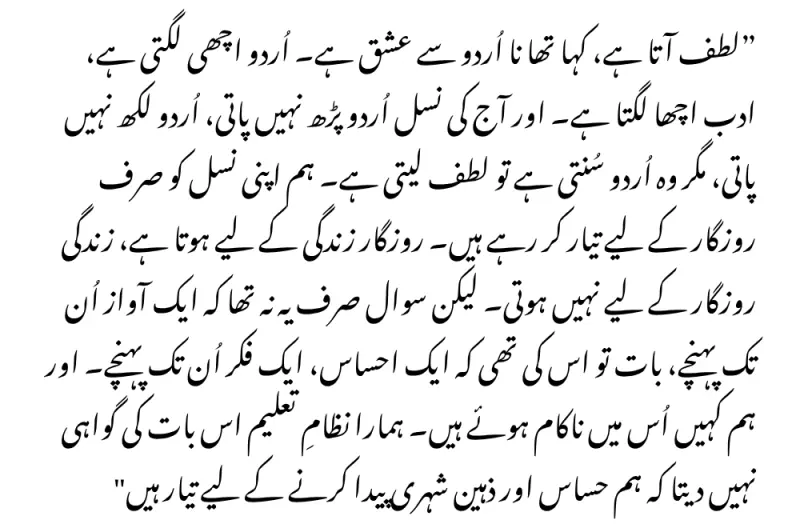
Dr Arfa Sayeda Zehra had the rare ability to distill an entire philosophy into a single sentence. I came across one of her interviews yesterday where she observed, “Aj ki nasal Urdu parh nahi paati, likh nahi paati, magar sunti hai to lutf leti hai” [Today’s generation cannot read or write Urdu, but they take pleasure in listening to it].
The command she held over the language was such that within that simple reflection lies a diagnosis not only of linguistic decay, but of an entire behavioural condition; one that captures what it means to live in a society where expression has been displaced by efficiency, where our mother tongues have been diluted by foreign dialects.
The language of ambition vs the language of affection
We, her students, are the generation she describes, “urdu parh nahi paati, urdu likh nahi paati magar urdu sunti hai tou lutf leti hai. Fluent in fragments, emotionally literate yet linguistically estranged. We can speak Urdu, even admire its cadence, but we cannot stay loyal to it long enough to read or write it.
We once took pride in perfecting our English accents and filling pages with borrowed eloquence. Yet with our own language, our connection has regressed to speech only. The very language that once shaped our imagination has been reduced to aural pleasure, consumed through dramas and reels, rather than inhabited through script and story.
Crediting to recent debates, we’re now familiar that this detachment is not accidental; it is patterned. It reflects a kind of postcolonial conditioning, where English remains the language of aspiration, and Urdu, the language of affection. One represents employability, the other emotion. Our inherited education system too rewards grammar, not gentleness; articulation, not awareness. The hierarchy of language has quietly become the hierarchy of value.
Yet Dr Zehra’s words remind us that “rozgaar zindagi ke liye hota hai, zindagi rozgaar ke liye nahi,” (Work is meant to sustain life, life is not meant to serve work) while diagnosing a deeper sociological transformation: the gradual replacement of meaning with monetisation.
Somewhere between our resumes and our timelines, we internalised a single rule: if something cannot be capitalised, it should not be prioritised. Reading for pleasure, writing for reflection, or creating for joy have all fallen outside our cognitive frame of “productiveness.”
“Learned helplessness”
Behaviourally, this is what psychologists might describe as instrumental narrowing — the process by which individuals, under chronic economic and social pressure, begin to value only goal-directed activities. Over time, we lose the capacity for autotelic pursuits, those done for their own sake. It’s not that we reject art or literature; we simply forget how to approach them without turning them into transactions. Her legacy calls for this ‘ehsaas’ and ‘fikr’ to reach those entrapped in their 9-5s or other monetary pursuits.
However, the roots of this narrowing are structural. The economic compression of Pakistan’s lower and middle classes has (and rightly so) imposed a survivalist logic on everyday life. When the mental bandwidth is consumed by bills, instability, or scarcity, attention shifts from exploration to endurance. People do not pursue what makes them happy because happiness feels like a resource they can no longer afford.
Layered on this is psychological withdrawal — what American psychologist Martin Seligman termed learned helplessness. After repeated experiences of constraint, be they economic, political, or social, individuals stop believing their actions can meaningfully alter outcomes. A person who feels unseen by the system gradually stops trying to express, create, or contribute. It is a quiet surrender that manifests as disinterest, or even cynicism, toward anything not linked to survival.
And then, of course, there is systemic neglect — the near-total absence of public infrastructure for creative and collective life. We have built cities that optimise for consumption, not connection. Libraries close before restaurants do. Cultural centres give way to parking lots.
For a society to produce art, it must first make space for leisure, both physical and psychological. This is why even leisure has been reframed through productivity. You’re reading a book? It had better be self-help. You’re drawing? Try monetising it. You’re collecting something? Sell it.
The narrowing of life
This is not just economic rationalisation; it’s a cognitive one, a narrowing of what counts as valuable effort. When every act must justify itself through output, imagination becomes inefficient.
Dr Zehra’s observation captures the full circle of this loss. We have become a generation trained to optimise, not to wonder; to function, not to feel.
The tragedy is not merely linguistic, that we can no longer write Urdu, but psychological: that we have lost the reflex to dwell in what is unmeasurable, unprofitable, and yet deeply human. To which she then questions: “humara taaleemi nizaam is baat ki gawahi nahi desakta ke hum hasaas aur zahin shehri paida karnay ke liye tayyar hain” (Our education system cannot claim that it is prepared to nurture sensitive and intelligent citizens).
Perhaps it is because our education system conditions students to capitalise every act, to survive their way through the rough conditions of the market, to endure the relentless races and competitive spaces. And perhaps that is what many deem to be the very purpose of education: to equip one for survival. Yet we cannot help but ask, is this truly what education was meant to produce?
Because as Dr Zehra reminds us, our system does not cultivate sensitive and intelligent citizens. She asserts that it is not yet prepared to create such individuals. And even when such citizens are born, perhaps as they navigate their way through this system, those very capacities — sensitivity and intellect — begin to fade.
from Dawn - Home https://ift.tt/Ee0JfnC
Comments
Post a Comment